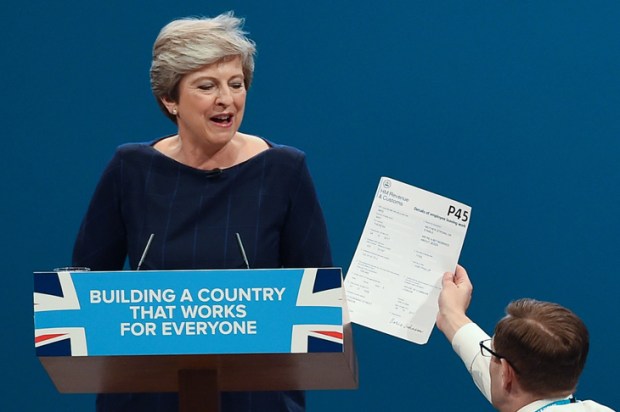The summer holidays couldn’t come soon enough for Theresa May. So desperate was she to get MPs away from Westminster that she wanted to send them home early. Normally, prime ministers would do almost anything to avoid headlines such as ‘MPs vote to go to the beach’. But in these circumstances, Downing Street decided that was the lesser of two evils.
In the end, Members of Parliament persuaded No. 10 that it would be wrong for the government to send the Commons into recess at a time of looming national crisis. It would have looked like an abdication of responsibility. But the fact that this idea was even contemplated reveals the panic gripping the Tory hierarchy.
Westminster is more febrile now than it has been in more than a decade. There’s constant chatter suggesting that disaffected Tories are close to having the 48 letters needed to cause a vote of no confidence in May. The government’s desire to send MPs home early lends credence to that.
One of May’s problems is that the two factions of the Tory party both feel she has let them down. Most Brexiteers feel that her Chequers deal is a dud, that it circumvents her own red lines and breaks faith with her commitments. At the same time, those Tories who want a soft Brexit are furious that the government accepted the Brexit ultras’ amendments on Monday. They feel that this shows she still isn’t prepared to stand up to their opponents in the party.
Compounding this problem is the fact that May still doesn’t have the votes to pass her Chequers plan. Indeed, support is declining all the time. Not only are more Eurosceptic MPs turning against the deal as they hear more complaints about it (mainly from irate constituents) but those who want a softer Brexit are also abandoning it. They say that, given the plan doesn’t have the votes to pass the Commons, there’s not much point batting for it.
The other reason that the summer can’t come soon enough for Downing Street is that Tory discipline is breaking down. We don’t just see rebellions in the voting lobbies, but Tory MPs attacking each other in the chamber — with the language becoming increasingly brutal. If the party is to be put back together again, No. 10 needs everyone to go away before things are said that cannot be unsaid.
But it is hard to see what will change over the summer. The fundamentals will still be the same when MPs return.
Those close to May hope that when parliament reconvenes in the autumn, they will be able to make the case again for their Chequers plan. Polling presented to cabinet ministers this week showed that more than 60 per cent of voters had no opinion on the detail of it, which encourages the remaining May allies that their fight is winnable.
But the bigger issue for May is that the arguments in favour of her Chequers offer are also arguments against her. Her case is — in effect — that the situation has got to such a point that this is the only course available. The shocking absence of proper ‘no-deal’ planning means that walking away from EU talks is a highly unattractive option — not to mention unfeasible, given the parliamentary arithmetic. And what the government signed up to on the Irish border in December means that a Canada-style free trade deal would lead to the erection of an economic border within the United Kingdom.
When No. 10 tries to make these points, though, many Leavers just want to shout back: ‘It’s your fault.’ They blame Theresa May for failing to prioritise no deal planning, for blowing the Tory majority in a needless election and for accepting the Commission’s stance on the Irish border. Worse, everyone knows that the Chequers deal is just the UK’s opening offer. The EU will come back asking for more, and that will make it even more unpalatable to many Tories. One cabinet minister tells me, ‘It does imply we are heading for no deal’. Their logic is that ‘the plan as currently constituted is at the limit of what is acceptable. If the EU won’t accept it, then…’
Considering all this, it is no surprise that people are asking if May can survive as leader. Currently, the leaders of the Brexiteers won’t call for her to go. They maintain that they want to change the policy, not the prime minister. But this argument is disingenuous. What Bonar Law told Tory MPs almost a century ago still holds: ‘The party elects a leader and that leader chooses the policy, and if the party does not like it, they have to get another leader.’
A new leader would have the advantage of not incurring the emotional response that May now does. But given the state of no deal planning, the parliamentary arithmetic and the Irish border, it is a struggle to see what a new leader could do that differently. This, and the fact that a leadership contest would take up several months of valuable negotiating time, means that Mrs May’s position is probably safe for a few more months yet.
But this doesn’t solve the problem of how Mrs May gets her deal through the Commons. One cabinet minister, who voted Remain, muses that her only hope is for the EU to overplay its hand, and demand concessions so great that the Tories would rally behind ‘no deal’ in a spirit of defiance. This minister warns that ‘doing it the conventional way isn’t going to work’.
This, though, raises the question of whether no deal is a viable option. One of those intimately involved in no deal planning predicts that if the government was really serious about it, then it could ‘get 80 per cent, 90 per cent ready’ by March, 2019. But this prompts the question, what is the missing 10 to 20 per cent and how bad would that be for the country?
Unwinding 40 years of integration was always going to prove complex. But, ironically, by seeking to minimise the risks from this, the government has ended up heightening them. It has forgotten that — as Donald Rumsfeld once said — weakness is provocative. When the EU responds to May’s Chequers proposal, we’ll find out just how risky her chosen path is.
Got something to add? Join the discussion and comment below.
Get 10 issues for just $10
Subscribe to The Spectator Australia today for the next 10 magazine issues, plus full online access, for just $10.
You might disagree with half of it, but you’ll enjoy reading all of it. Try your first month for free, then just $2 a week for the remainder of your first year.















Comments
Don't miss out
Join the conversation with other Spectator Australia readers. Subscribe to leave a comment.
SUBSCRIBEAlready a subscriber? Log in